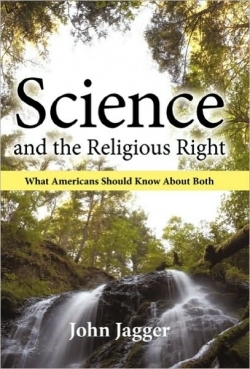Science and the Religious Right
What Americans Should Know About Both
According to biophysicist John Jagger, scientific ignorance abounds these days. In Science and the Religious Right, he intends to educate Americans about some basic and necessary scientific facts, as well as some commonly held religious beliefs. The author, a retired professor of general studies and biology from the University of Texas at Dallas, guides readers through an organized presentation of physical and biological science, before moving into secularism, religion, and the religious right.
Jagger defines his audience early and aptly. Namely, he has designed the book neither for scholars nor for biblical literalists. Instead, he aims it toward thoughtful and curious nonscientists who are open to the presence of scientific truths and the possibility of religious limitations. The author proficiently summarizes topics such as evolution, chemistry, and the brain. Similarly, he provides synopses of various religious beliefs and ethics. In addition to a lot of summary reporting, the author offers many of his own theories. For example, he posits, “Most of the ethical principles by which we live today either are genetically programmed into us or are human inventions.” With only thirty-two endnotes, the book might read more powerfully with additional primary source quotes, plenty of which could undoubtedly be found in the materials cited in the book’s bibliography.
As a result of these scientific and religious summaries, Jagger unfortunately does not introduce the specific topic of the religious right until midway through the book. Again, actual quotations from creation scientists or intelligent design supporters would strengthen the reading. Once the author does discuss the religious right, he raises several interesting questions: why did God make intelligent life in the universe so rare, for example. He also touches upon the relationship between science, religion, and politics.
The author concludes with thoughtful ideas about the future of secularism, and about how science and religion might successfully cooperate toward the goal of obtaining a peaceful and loving world. Moreover, he provides a secular moral blueprint: 1) Ethical principles are essential; 2) Basic law is essential; 3) Human life is precious; 4) Peace is good; and 5) Science is good. A helpful glossary of primarily scientific terms, as well as a list of recommended books, round out the book. Thorough and well-organized, this book provides informative material about both science and religion to readers who might already have some knowledge about either subject.
Reviewed by
Beth Hemke Shapiro
Disclosure: This article is not an endorsement, but a review. The publisher of this book provided free copies of the book and paid a small fee to have their book reviewed by a professional reviewer. Foreword Reviews and Clarion Reviews make no guarantee that the publisher will receive a positive review. Foreword Magazine, Inc. is disclosing this in accordance with the Federal Trade Commission’s 16 CFR, Part 255.

